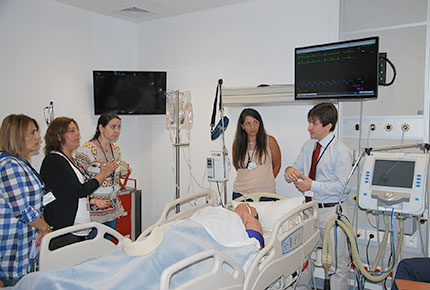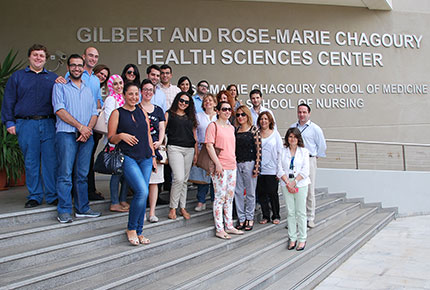Rigorous training in organ donation and transplantation protocol
LAU’s Clinical Simulation Center hosts EMPODaT international assessment seminar at the simulation center in Byblos

The international experts leading the workshop were impressed by the state-of-the-art Clinical Simulation Center.

Participants from LAUMC-RH presented the conclusions of a research project they conducted about the relationship between current practices and organ donation at the LAU affiliated hospital.
Last week, 30 Lebanese health professionals came a step closer to attaining a postgraduate certificate from Universitat de Barcelona after attending an international assessment seminar hosted by LAU on the Byblos campus. Led by local and international experts, the participants — 15 from LAU Medical Center–Rizk Hospital and LAU’s schools of Medicine and Nursing and an additional 15 from the University of Balamand — were assessed for the competencies they had gained during the year they had spent enrolled in the European Mediterranean Program in Organ Donation and Transplantation (EMPODaT).
“The EMPODaT training program mustn’t stop here,” says Clinical Professor of Nephrology at LAU Antoine Stephan. “We must encourage the participants to apply all they have learned in their daily work at the hospital so we can alleviate the great shortage of organ donations Lebanon suffers from.”
Stephan conducted a training session about kidney transplantation during the one-week seminar, which itself was but one part of EMPODaT, a multi-disciplinary training program that began twelve months ago.
“All the components of this program — the online courses, local seminars, and this international assessment seminar — support and complete each other,” says Dalale Khoury, head nurse of the Medical Surgical Unit at LAU Medical Center–Rizk Hospital, who had already completed the online modules and passed the examinations.
Khoury and other participants from LAU Medical Center–Rizk Hospital presented the conclusions of a research project they had conducted about the relationship between current practices and organ donation at the LAU hospital. Theirs was one of six group studies evaluated by the board of local and international experts during the international assessment seminar. “It was good to work with other physicians,” said nurse and case manager Noellie Eid, whose group was comprised of nurses and medical residents. “It’s helpful to meet our colleagues. It improves coordination and encourages a multi-disciplinary approach. The more we collaborate together, the more likely we are to fulfill our purpose.”
Thirty participants from two universities in each Morocco and Egypt are also expected to complete the EMPODaT program, which is funded by the European Commission.
The Clinical Simulation Center (CSC) at LAU’s Chaghoury Medical Center in Byblos played host to the first two days of the seminar, during which local and European experts presented and discussed case studies related to kidney, liver, heart and lung transplantation. Impressed by the state-of-the-art facilities, they guided participants through hands on simulations with lifelike dummies to strengthen specific skill-sets needed during the organ donation and transplant process.
“We were pleasantly surprised to hear that sometimes parents have asked for their children’s organs to be donated, only to find that the physicians had not done their job properly in maintaining the patient so that they could be a donor,” says Stephan, who is also vice-president of the National Organization for Organ and Tissue Donation and Transplantation.
The organization, he explains, has made great gains in recent year, including securing commitment and endorsement for organ donation by religious leaders from all faiths, and raising public awareness and support through a number of sensitization campaigns. The EMPODaT program of training and education for physicians, adds Stephan, is now a crucial and welcome development. “Most studies have shown that the primary influence and factor in increasing organ donation rates is the medical profession. If they are convinced and do their job properly, the public will follow.”
More
Latest Stories
- LAU Athletes Bring Home Trophies from Athens and Belgrade
- From Ruins to Resources: Reimagining Lebanon’s Post-Destruction Urban Spaces
- Medical Graduates Showcase their Research Leadership
- To Dance Toward Tomorrow
- Six LAU Faculty Listed Among the World’s Top 0.05 Percent by ScholarGPS
- Lebanon’s Brightest Compete for LAU Engineering Scholarships
- This Summer: Robotics and Artificial Intelligence Summer School for Middle Schoolers
- Into the Psychology of Justice

